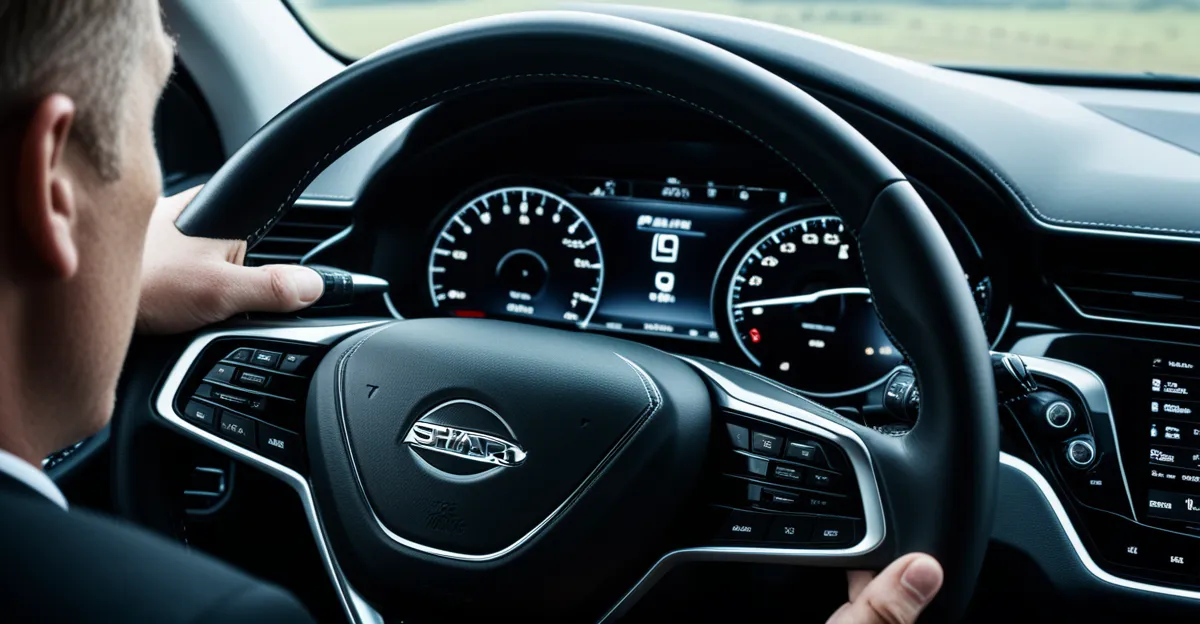Key Emerging Technologies Shaping the UK Auto Industry
Emerging technologies such as electric vehicles, autonomous driving, and connected car technology are fundamentally transforming the UK auto industry. These advancements are not only revolutionizing car manufacturing but also redefining mobility experiences throughout the country.
The adoption of electric vehicles (EVs) has accelerated, driven by stricter emissions targets and growing consumer demand in the UK auto industry. Increasingly, manufacturers are integrating advanced battery technology and energy-efficient designs to improve range and affordability. Autonomous driving technology is also progressing swiftly, with UK companies and research institutions pioneering sophisticated driver-assistance systems that pave the way toward fully self-driving cars. This technology enhances safety and convenience by utilizing sensors, cameras, and AI for real-time decision-making.
Additional reading : How Are Emerging Technologies Reshaping the UK Automotive Industry?
Connected car technology, a key component in the emerging technology landscape, is enabling vehicles to communicate with each other and infrastructure using IoT solutions. This connectivity supports traffic management, predictive maintenance, and personalized user experiences. In the UK auto industry, such tech boosts operational efficiency and creates opportunities to offer new digital services to consumers.
Current readiness levels for these innovations vary: while electric vehicles see significant consumer uptake, autonomous systems remain in early-use phases requiring regulatory and infrastructural support. Connected car adoption is growing steadily, integrating seamlessly with smartphones and smart cities initiatives. For manufacturers, suppliers, and consumers, these emerging technologies offer exciting possibilities but also demand investments in new skills, supply chains, and collaborative innovation models to stay competitive.
Have you seen this : How Can the UK Automotive Industry Innovate to Meet Future Challenges?
Challenges Facing the UK Auto Sector Amid Rapid Technological Change
The UK auto industry faces significant automotive industry challenges as it navigates rapid technology disruption. One primary barrier to electric vehicle adoption remains inadequate charging infrastructure. Consumers express concerns over range anxiety and charging accessibility, which hinders wider acceptance. Despite government initiatives, the pace of infrastructure expansion does not yet meet growing EV demand in many urban and rural areas, stalling market growth.
Investment and operational hurdles are also prominent for integrating autonomous driving and connected car technology. Developing reliable, safe autonomous systems requires substantial R&D funding and rigorous testing, while adapting manufacturing lines to produce connected vehicles involves complex supply chain adjustments. These challenges translate into higher upfront costs and uncertain returns for manufacturers and suppliers in the UK auto industry.
Furthermore, workforce disruptions emerge as new technology adoption demands specialist skills in software, AI, and electronics, which differ markedly from traditional automotive engineering roles. This shift necessitates comprehensive retraining programs and poses short-term labor market friction. Together, these factors underscore the multifaceted barriers the UK automotive sector must overcome to fully leverage emerging technologies and maintain competitive advantage.
Opportunities for Competitiveness and Growth in the Face of Disruption
The UK auto industry stands at a pivotal juncture where emerging technologies unlock substantial auto industry opportunities for market expansion and innovation. The transition toward electric vehicles (EVs) is particularly significant, as improved battery technologies and falling production costs enhance affordability and consumer appeal. This creates a fertile market for growth, especially as environmental regulations and consumer preferences increasingly favour low-emission vehicles.
Beyond electrification, connected car technology offers unique prospects to diversify revenue streams. By integrating internet-of-things (IoT) solutions, the UK auto industry can develop services such as real-time traffic updates, predictive maintenance alerts, and in-car entertainment, which improve customer experience and create ongoing engagement beyond the point of sale. These digital offerings embed vehicles into a broader connected ecosystem, boosting the sector’s relevance in a smart, data-driven mobility landscape.
Innovation fueled by autonomous driving research also presents an opportunity for UK competitiveness on a global scale. As companies refine machine learning models and sensor capabilities, there is potential to lead in safe, effective self-driving solutions that transform logistics, public transport, and personal mobility. Realising these advantages requires strong collaboration between manufacturers, technology providers, and government bodies. Partnerships can accelerate the scaling of breakthroughs by sharing expertise, mitigating risks, and pooling investments.
In summary, the UK auto industry’s future growth hinges on harnessing electrification, connected vehicle services, and autonomous systems through concerted innovation strategies. Embracing such opportunities can establish the UK not only as a regional leader but also as a global hub for next-generation automotive technologies.
Strategies for Successful Adaptation in the UK Auto Industry
Adapting effectively to rapid technology disruption in the UK auto industry demands targeted adaptation strategies that address both innovation and workforce transformation. Foremost among these is prioritising sustained investment in R&D. Such funding accelerates breakthroughs in electric vehicles, autonomous driving, and connected car technology, enabling manufacturers and suppliers to develop competitive, market-ready solutions. Without robust R&D commitment, the industry risks falling behind global peers advancing similar technologies.
Parallel to technological investment is the urgent need for comprehensive workforce retraining programs. The shift toward software-driven, AI-enhanced vehicle systems requires skilled professionals well-versed in electronics, machine learning, and data analytics. Upskilling existing employees and creating education initiatives focused on emerging technologies directly mitigates labour market friction caused by evolving technical demands. This workforce evolution is crucial for maintaining operational efficiency and innovation capacity in an increasingly digital automotive landscape.
Lastly, fostering strong cross-industry and public–private collaborations catalyses knowledge exchange and resource pooling. Partnerships between manufacturers, technology firms, educational institutions, and government bodies help address common challenges such as supply chain adaptation and regulatory compliance. These collaborations create scalable solutions and accelerate technology adoption, ensuring the UK auto industry can respond nimbly to ongoing changes while securing its global competitiveness.
Case Studies: UK Automotive Leaders Responding to Emerging Technologies
Examining UK automotive case studies reveals how industry leaders are driving innovation through strategic integration of electric vehicles, autonomous driving, and connected car technology. For instance, several prominent manufacturers have invested heavily in expanding their EV portfolios, showcasing production shifts toward electric models with cutting-edge battery technologies that extend vehicle range and improve charging efficiency. These initiatives demonstrate a clear response to evolving consumer demands and government policies promoting low-emission transportation.
Supplier adaptations also play a crucial role in the UK auto industry’s transformation. Key component providers have revamped their operations to accommodate software-centric products and advanced electronic systems integral to autonomous and connected vehicles. This transition often involves the reconfiguration of supply chains to source specialized materials and skilled labor, reflecting the systemic nature of technological change. By innovating their product offerings and capabilities, suppliers are crucial enablers of emerging technologies, supporting manufacturers’ ambitions and sustaining industry-wide competitiveness.
Public-sector collaborations and pilot projects further exemplify the UK’s proactive stance. Notable examples include joint ventures between automakers, technology firms, and government agencies aimed at testing autonomous vehicle deployment on public roads. These projects validate new systems in real-world conditions, addressing safety standards and regulatory compliance while enhancing public trust. They also foster a collaborative ecosystem that accelerates research and innovation, positioning the UK auto industry as a leader in pioneering next-generation mobility solutions.
Together, these case studies illustrate the dynamic interplay between manufacturers, suppliers, and policymakers, underscoring the UK auto industry’s commitment to leveraging emerging technologies and maintaining its competitive edge globally.
The Role of Policy and Regulation in Technology Adoption
Policy and regulation play a critical role in shaping the UK auto industry’s adoption of emerging technologies such as electric vehicles, autonomous driving, and connected car technology. Current and proposed regulations focus strongly on accelerating the transition to low-emission vehicles, with the UK government setting ambitious targets for phasing out petrol and diesel car sales. These legislative frameworks create essential market signals that incentivize manufacturers and consumers alike to embrace electric vehicles.
Government support extends beyond mandates through a range of incentives and funding programs aimed at reducing barriers to technology adoption. For example, subsidies for EV purchases and investments in charging infrastructure directly address consumer concerns around cost and accessibility. Similarly, regulatory sandbox environments facilitate testing and deployment of autonomous vehicle technologies, ensuring safety standards without inhibiting innovation. This approach balances the need for rigorous oversight with the flexibility required in cutting-edge automotive research.
Aligning industrial strategy with sustainability goals further underscores the importance of cohesive policy. Regulations encourage integration of connected car technology to improve traffic management and reduce emissions, linking environmental objectives with technological advancement. These policy measures also foster collaboration between the public and private sectors, enabling shared resource development and coordinated responses to industry challenges.
In summary, effective policy and regulation provide the framework within which the UK auto industry can confidently invest in and deploy emerging technologies, ensuring progress toward a sustainable and innovative automotive future.
Expert Insights and Future Outlook for the UK Auto Industry
Industry experts widely recognize that the UK auto industry is navigating a critical transformation driven by emerging technologies like electric vehicles, autonomous driving, and connected car technology. Leading analysts forecast that electric vehicle adoption will continue its upward trajectory as battery innovations lower costs and extend ranges, addressing consumer concerns effectively. This momentum is expected to accelerate market penetration, positioning the UK as a significant hub for EV production and consumption.
Regarding autonomous driving, experts emphasize cautious optimism. While fully driverless cars remain in developmental stages, substantial progress in driver-assistance systems will reshape mobility within the next decade. Analysts highlight the importance of regulatory frameworks and infrastructure alignment to translate technological readiness into widespread deployment. This will require sustained collaboration across the industry and government sectors to overcome operational and legislative hurdles.
Connected car technology is viewed as a crucial enabler for future mobility, blending vehicles into smart, data-driven ecosystems. Future trends predict enhanced vehicle-to-everything (V2X) communication capabilities, enhancing safety and user experience. Experts suggest industry stakeholders focus on cybersecurity and data privacy as these systems grow in complexity.
Overall, recommendations stress proactive investment in R&D, continuous workforce upskilling, and flexible policy adaptation as essential strategies. Industry leaders urge manufacturers, suppliers, and policymakers to maintain agile responses to evolving technologies to secure the UK auto sector’s global competitiveness. This forward-looking approach will ensure the UK auto industry not only adapts but thrives amid accelerating technological change.








